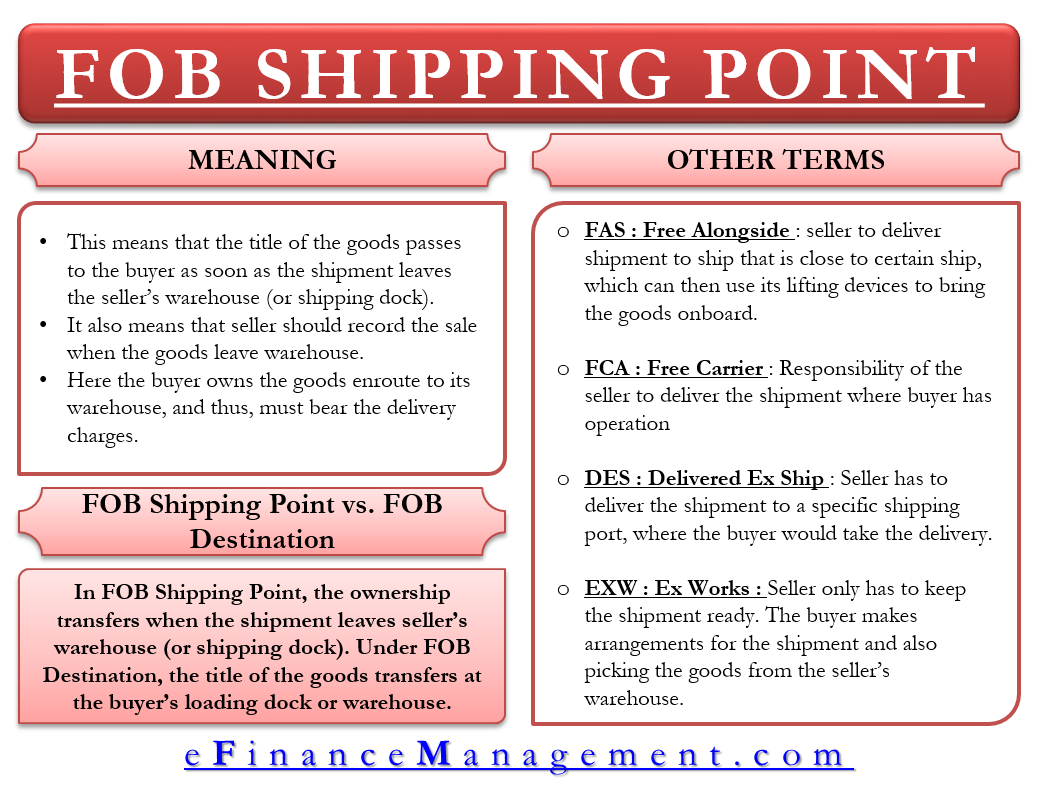FOB Shipping Point or ‘Free on Board Shipping Point’ or ‘FOB Origin’ is a shipping term indicating that a buyer must pay for the delivery of the goods. This means that the title of the goods passes to the buyer as soon as the shipment leaves the seller’s warehouse (or shipping dock). It also means that the seller should record the sale when the goods leave the warehouse.
Here, the buyer owns the goods en route to its warehouse and thus, must bear the delivery charges. So, if the goods get damaged in transit, the buyer must file a claim with the insurance company.
If you are not familiar with what FOB is, you can read our exclusive post on Free on Board.
Explanation with Example
Let us understand FOB Shipping Point with the help of an example. Suppose Company A (seller) and Company B (buyer) agree on FOB Shipping Point. Company A puts the goods onto a common carrier on December 30, and the same arrives at the buyer’s location on January 2.
In this case, both seller and buyer record the transaction in their accounts on December 30. The seller will record the sale, increase accounts receivable and reduce the inventory. On the other hand, the buyer will record the purchase, increase the account payable, and increase the inventory as well.
Also Read: FOB Meaning
Journal Entry
On December 30, the journal entry in the books of the seller will be accounts receivable debit and sales credit. For the buyer, the journal entry will be purchase debit, freight debit and accounts payable, and cash credit.
Reality is Different
In FOB Shipping Point buyer must record the purchase as soon as the goods leave the seller’s warehouse (or shipping dock). In practice, however, it is difficult for the buyer to record the delivery when the goods leave the seller’s warehouse. It requires proper notifications to enter the buyer’s inventory management system. Thus, the receipt of goods completes at the receiving dock of the buyer.
This suggests that there is a difference between what the term implies and its actual accounting implementation.

FOB Shipping Point vs. FOB Destination
In FOB Shipping Point, the ownership transfers when the shipment leaves the seller’s warehouse (or shipping dock). Under FOB Destination, the title of the goods transfers at the buyer’s loading dock or warehouse. Or, the title of the goods transfers once the goods reach the buyer’s specified location. The seller remains the owner of the goods and is also responsible for the goods during the transit.
There is a difference in accounting as well. In FOB Shipping Point, both seller and buyer record the delivery once the shipment leaves the seller’s warehouse (or shipping dock). In FOB Destination, the seller and buyer record the sale (and purchase) only after the shipment reaches the buyer’s dock.
Another difference is in the division of costs. Under the FOB shipping point, the seller bears the cost until the shipment reaches the supplier’s shipping dock. Once the goods are on the ship, the buyer is responsible for all the expenses, including customs, taxes, and other fees. Under FOB Destination, the seller is responsible for all costs until goods reach their destination port. After the entry into the port, all expenses are borne by the buyer.
FOB Shipping Point or FOB Destination – Which is Better?
Buyers must insist on FOB shipping point terms as it gives them complete control over the delivery of goods after they leave the seller’s warehouse (or shipping dock).
On the other hand, FOB Destination allows the buyer to add the inventory only when the purchase shipment reaches perfect condition. So, it is good from an accounting perspective. Also, under FOB Destination, the buyer has to take care of fewer things.
Other Shipping Terms
Though FOB is the most common term in the shipping world, there are other important and must-know terms as well;
FAS
FAS or Free Alongside means the seller must deliver the shipment to a ship that is close to a certain ship, which can then use its lifting devices to bring the goods onboard.
FCA
FCA or Free Carrier means it is the seller’s responsibility to deliver the shipment at the port or airport, or railway terminal where the buyer has an operation.
DES
Under DES or Delivered Ex Ship, the seller has to deliver the shipment to a specific shipping port, where the buyer would take the delivery.
EXW
Under EXW or Ex Works, the seller only has to keep the shipment ready. The buyer makes arrangements for the shipment and also picks up the goods from the seller’s warehouse.
RELATED POSTS
- Free On Board – Meaning, Qualifiers, Obligations, and Benefits
- Free Carrier – Meaning, Obligations, Benefits, Pros and Cons
- Free Alongside Ship – Meaning, Obligations, Advantages and Disadvantages
- Cost and Freight – Meaning, Obligations, and Use
- Delivered Ex-Ship – Meaning, Example, and Relevance
- Delivered at Terminal – Meaning, Obligations and More

